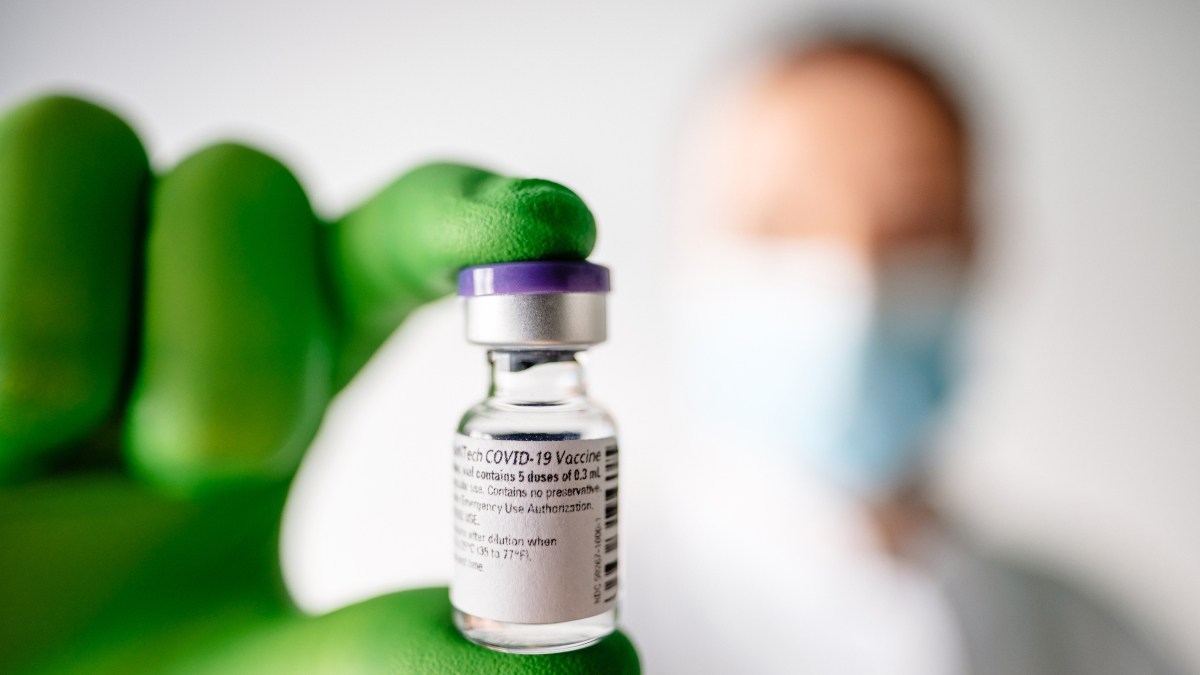[ad_1]
Taiwan and China are locked in a dispute over who is actually to blame for the self-governing island’s lack of vaccine supplies, underscoring the two sides’ wider political and strategic conflicts.
Ruling Democratic Progressive Party politicians have claimed Beijing is responsible for the island’s failure to secure shipments, accusations the mainland has refuted as a lame bid to deflect attention from their own procurement policy failings.
The row was triggered when Taiwan Health Minister Chen Shih-chung blamed an unnamed “malignant force against the island†for his ministry’s failure at the end of last year to strike a deal for five million shots of the vaccine developed and manufactured by American drugmaker Pfizer and its German partner BioNTech.
Chen said at a press briefing on Wednesday that had it not been for “someone who did not want Taiwan to be happy,†he would have already clinched a deal for the Pfizer-BioNTech dose and that the first consignment would have already by now arrived on the island.Â
Chen also claimed that the purchase was scuppered at the last minute as both parties had been preparing press releases to announce their cooperation when the German firm cited an “internal disagreement†and “logistical problems†before walking away from the deal.
The health chief sidestepped questions about whether it was the vaccine’s exclusive reseller for the Greater China Region, the Shanghai-based Fosun Pharma, that blocked the island from getting the shots, which have proven to be 95% effective against the novel coronavirus in human trials. Â
“Sometimes it’s normal for a business entity to allocate its much sought-after products to just a few customers to maximize its interests and Taiwan won’t blame a particular company when an agreement cannot be reached,†said Chen.
It has been widely reported that Taiwan sought to source directly from BioNTech and made a US$50 million advance payment, but the German side still turned down the order after Fosun protested.
To avoid dealing directly with a mainland entity like Fosun, Taiwan also tried to buy via a Hong Kong-based firm, but that plan did not materialize either. Chen also added that talks had been complicated by the European Union’s new restrictions on vaccine shipments from the continent. Â
While hitting back at Chen’s hints that Beijing was behind the failed vaccine deal, officials in charge of Taiwan policies in Beijing have proposed to ship Chinese-made drugs to the island but political and legal barriers must come down first.
China’s Taiwan Affairs Office spokeswoman Zhu Fenglian told reporters that products from Sinovac and state-owned SinoPharm, already approved for emergency use by Chinese watchdogs, would be primed for Taiwan almost instantly if the island was prepared to take them.Â
“Taiwan is making false allegations against Beijing, but the latter now says it is willing to donate or sell homegrown shots to the island, when the laggard in Asia’s race to vaccinate populations may have nowhere else to go to source meaningful numbers to at least protect its at-risk people, at a time the public’s trust and patience are wearing thin,†read an op-ed on the website of Beijing’s mouthpiece People’s Daily.Â
Taiwan has so far succeeded in keeping the virus at bay: the country of nearly 24 million residents had a total caseload of 938 as of Thursday.Â
Still, when asked about Beijing’s offer, Chen said Chinese vaccines would be considered only if mainland producers furnish full information and local laws banning the imports of China-made immunization products could be amended. Â
“If people want to get these jabs, they may want the ban to be revoked. But there is no widespread call among the people to buy from China, nor has our expert panel included Chinese products in their recommendation because we don’t have enough information … Of course, we won’t rule out buying from China for the future, if Chinese shots work the wonder and convince all of us of their efficacy,†Chen noted.
There are concerns that Chinese doses may induce further dissension among the already divided Taiwanese populace, which is split on pro and anti-Beijing lines.
Former president Ma Ying-jeou, with the Kuomintang, the island’s Beijing-friendly opposition party, lambasted Chen and the ruling party for politicizing procurement and shutting out Chinese drugs.
Ma said confidence in these shots had been boosted after top leaders and officials across Indonesia, the United Arab Emirates and Egypt had taken the jabs. In response, Chen said Taiwanese people would make their own judgments about Chinese drugs.Â
Taiwanese papers reported on Thursday that about 200,000 doses from AstraZeneca, allocated via the World Health Organization’s Covax mechanism to which the island is also a party, could be shipped as soon as next week.
Apple Daily Taiwan said the health ministry and China Airlines, Taiwan’s flag carrier, had been readying planes, crew and ultra-low temperature storage facilities to fly batches from Frankfurt to kick off inoculations in March.Â
Taiwan has also placed direct orders for another 10 million shots with the same British vaccine supplier, as well as 5.05 million doses from Moderna. Â
BioNTech has also reassured Taiwan of its “firm commitment†to shipping vaccines to the island as part of its global effort to end the pandemic. Delivery details are now being worked out with the island, according to Reuters.
Taiwanese President Tsai Ing-wen said on Thursday that her government would adopt a two-pronged strategy of both tapping multiple foreign supplies and developing homegrown drugs to offer protection for at-risk Taiwanese and to eventually get everyone inoculated.Â
Tsai said more batches would start coming in from the second quarter. She also revealed that vaccine candidates from two local firms had entered second-stage human trials.Â
On Wednesday, Tsai’s deputy, Vice President William Lai, also mentioned “foreign influences militating against procurement†and emphasized the need for self-sufficiency when inspecting several local firms developing indigenous vaccines. Â
[ad_2]
Source link













